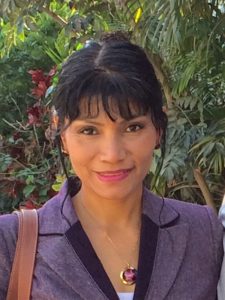 As a human-rights lawyer whose mission is to advance the status of indigenous women, Dr. Lupe Allyon Ruiz felt an entirely new level of empowerment recently in New York.
As a human-rights lawyer whose mission is to advance the status of indigenous women, Dr. Lupe Allyon Ruiz felt an entirely new level of empowerment recently in New York.
There, the Shepherd of the Hills Church parishioner got the chance to meet and share her views with Presiding Bishop Michael Curry of the Episcopal Church at the U.N. Commission on the Status on Women “Women’s Economic Empowerment in the Changing World of Work” or UNSCW61, which met March 13-24 in New York City.
“Bishop Curry is very charismatic and asked that we take his message back to the parishes,” said Ruiz’s husband, Bill New, who serves as his wife’s official interpreter.
That message was multifold: the U.N. is not perfect, but it represents the best option available for advancing causes from women’s issues to climate change; that the representatives at UNSCW61 take this message back to their parishes; and that the Episcopal Church remain in a position to help influence the direction of the United Nations, according to Dr. Ruiz’s presentation.
For Ruiz, the opportunity to speak on the status of indigenous women was the chance of a lifetime. Born in Tingo Maria, Peru, and a legal permanent resident of the U.S. and citizen of Peru, she was the only person from the Episcopal Diocese of Central Florida to be appointed by Curry to attend the event, which focused on the topics Agenda 2030 and Sustainable Developmental Goals.
“Participating in the UNSCW61 was a wonderful opportunity and experience for me,” Ruiz said in her presentation. “I believe that I contributed to both the ecumenical as well as the socio-economic objectives of the Episcopal Church and the U.N. My ongoing commitment is to present the mission of both the Episcopal Church and the U.N. to interested groups in our diocese as well as other Episcopal dioceses.”
Although Ruiz has worked for various NGO and governmental agencies in Latin America, including USAID, this was her first trip to the U.N. “Thousands attended the UNSCW61 and perhaps 200 from the Episcopal and Anglican Churches,” New said.
Ruiz, 48, served as an observer at UNSCW61, but got the privilege to share her work in Latin America with Curry at his residence. She has been a key figure in promoting the “Planet 50-50 by 2030 Step It Up for Gender Equality” campaign in Latin America, discussing how girls and women make up more than half the world’s population but whose progress is severely impacted by poverty, climate change, food and water insecurity, lack of health care, and global economic crises.
To counter those problems, UNSCW61 leaders say that change begins at home, where families can delegate responsibilities to form a family environment that is relative to economic empowerment of women. Such actions ensure a better standard of living and make globalization more inclusive for girls and women.
Family dynamics, in turn, help women and girls make an impact toward sustainable development, inclusive societies and economic productivity and growth, and more. Leaders are asking governments to monitor and review Agenda 2030 at all levels to ensure success, and that men take an active role in promoting equal rights. Men are asked to stand against discrimination and violence against women, and to provide equal opportunity for women in the workplace.
“The UN promulgated another resolution urging governments at all levels to continue the fight against poverty and launch efforts to reach sustainable development goals by 2030,” said Ruiz, who has resided in Citrus Hills since June of 2016. “The only way this will happen is if a nexus is created between the private and public sector.”
